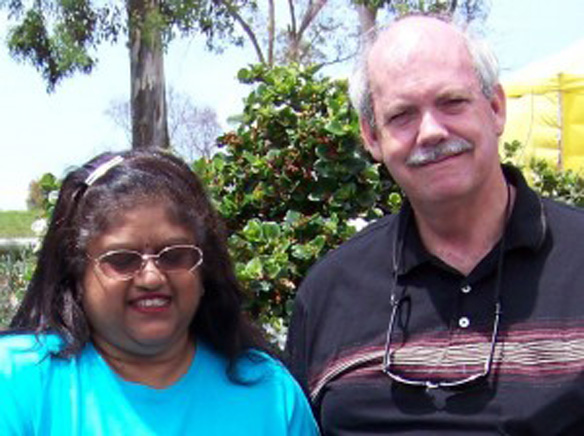o care for 16 babies, but Ana and Dale Griffin say they are up to the task. The Spring Valley couple has a secret weapon – pacing. They serve as foster parents for one baby at a time through Angels Foster Family Network, a nonprofit that requires San Diego families devote their full attention to one young child (or sibling set) at a time.
o care for 16 babies, but Ana and Dale Griffin say they are up to the task. The Spring Valley couple has a secret weapon – pacing. They serve as foster parents for one baby at a time through Angels Foster Family Network, a nonprofit that requires San Diego families devote their full attention to one young child (or sibling set) at a time.
This philosophy makes sense to Griffins, and not only because there is no washing machine that could handle such a heavy load. Babies need a great deal of focused attention, says Ana, a stay-at-home foster mother in her late fifties. Many of the babies she and her husband have fostered over the last decade have had a rocky start in life, like drugs or alcohol in their systems. “It’s heartbreaking, but also heartwarming because they are so resilient,” she says. “It’s an incredible journey, an emotional journey where you will find out just how strong you are.”
Foster parents need strength, but they are never alone. “The support we get at Angels is great,” Ana says. Dale, an accountant with the sheriff’s department, adds that the couple not only received extensive screening and training before their first placement, but has access to ongoing education and support. Through the network, foster parents receive practical guidance on managing relationships with biological parents, scheduling visits with doctors and specialists, and dealing with the feeling of loss after children have been reunified with their families. “Saying goodbye the first time was so hard and I was in such a funk afterward that I didn’t think I could do it again,” Ana recalls. It took a few weeks to get past the sadness, but they found the benefits of fostering outweighed the costs, and signed up for another placement.
The Griffins are unusual, though. Most people don’t consider fostering and that has led to a crisis level shortage of qualified foster parents in San Diego County. Jeff Wiemann, Executive Director at Angels, says that the unfortunate reality is that their nonprofit organization can only accommodate one of every three requests for placement they receive from the County Department of Child Welfare. He believes part of the solution to this is greater education about the rewards and challenges of fostering. “Fostering is not right for everyone, but if we can reach more people with the facts about being a foster family, many more would realize that they could make a difference in a child’s life,” he says.
The Griffins do not have biological children, but they adopted their thirteenth foster child when it became clear that reunification with his biological family was not possible. Other families include foster children into a home filled with their biological children. Some are single people; some are same-sex couples. “There are health and safety requirements people must meet before they bring a young child into their lives, but Angels is looking for kind and loving people who reflect the diversity of our community,” says Wiemann.
Wiemann, who was a foster parent himself, is passionate about raising awareness about fostering, and bridging the fostering gap to meet the needs of young children in San Diego County. There are currently 3,500 children in the foster care system each year in San Diego, 1,400 of whom are under the age of five.
Angels’ hopes to identify people like the Griffins who can provide long-term care for young children. A child might need care for a weekend or five years, but the organization strives to provide each child with one foster family. “Research consistently tells us that when young children are raised in stable, loving homes, their brains become wired for attachment, and the ability to connect with people makes a tremendous difference in their lives and future success both socially and economically,” he says. “One of the core values at Angels is that we believe children fare better when they are placed in one foster home rather than being ‘bounced’ from home to home. They are happier this way, and the benefits are long-lasting and far-reaching.” He says children who have healthy attachments are far more likely to graduate high school and positively contribute to the community. Conversely, many children under-served by the foster care system are at greater risk for gang involvement, alcohol and substance abuse, and teen pregnancy. “It is so inspiring to think about the positive difference foster parents are making when they step in, and set a child’s life on a different course. They help children grow up to be emotionally healthy and economically productive adults,” he says. “That helps everyone in the community.”
The Griffins agree. “People were afraid that we would get attached and we did, but children deserve someone to be attached to them and that’s the goal,” she says. It’s hard, but it’s for all the right reasons and “that makes it all worth it.”
For more information about how to be a foster parent, or how to support foster children, please visit angelsfoster.org.













